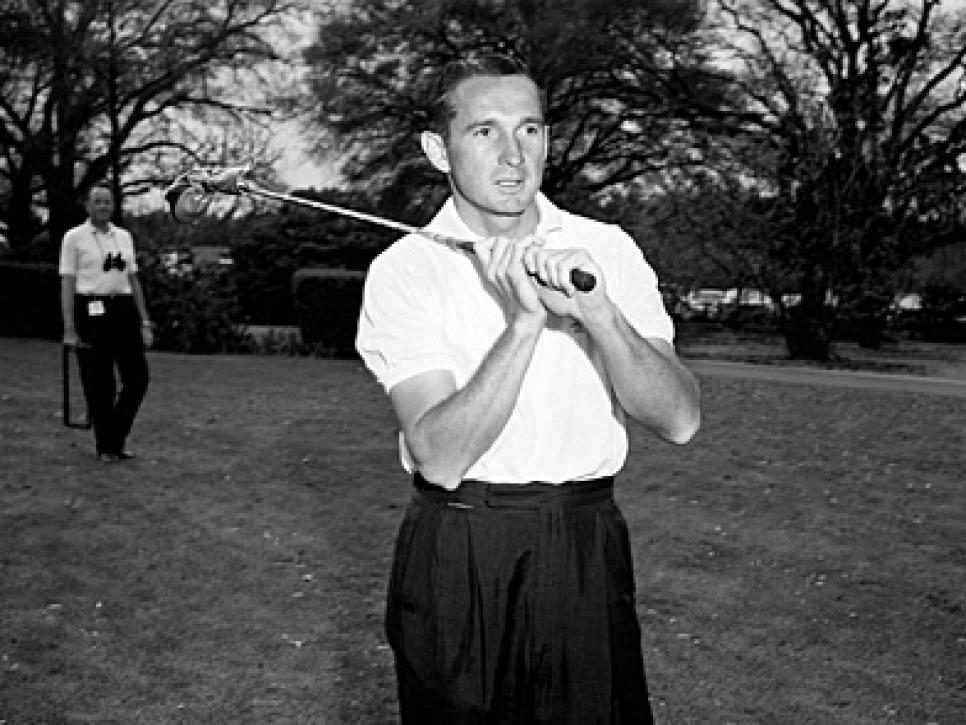News
Tiger Woods ruling recalls Dow Finsterwald in 1960 Masters
AUGUSTA, Ga. -- Seated near the ropes on the right side of the 10th fairway at Augusta National GC, at the bottom of the sweeping hill, rules official Bill Katz was holding court Saturday morning with a handful of patrons.
"Yes, we've been answering a few questions," Katz said with a wry smile and overt understatement. "What would you like to know?"
Actually, we only wanted to know where to find Dow Finsterwald, the 1958 PGA champion who is a member of the Masters Tournament Rules Committee and also was assigned to the 10th hole. We found him behind the green, in a tie and blue blazer, his silver hair neatly combed back exposing his tan, weathered face.

Before Tiger Woods famously escaped the guillotine in this 77th Masters, Finsterwald fell upon the mercy of the Masters Competition Committee in a similar fashion. He set the precedent that perhaps paved the way for Woods to continue on this weekend in search of his fifth green jacket despite signing for an incorrect scorecard, an infraction that traditionally results in disqualification. Instead, Woods, who took an improper drop on the 15th hole Friday, had a two-stroke penalty retroactively added to his scorecard and he plays on.
The Finsterwald incident happened 53 years ago, in the 1960 Masters. Arnold Palmer - perhaps Finsterwald's best friend in the game - birdied the final two holes and beat Ken Venturi by a stroke. Finsterwald finished third, two shots back.
Those two shots were huge.
In the second round, Finsterwald, playing with Billy Casper, had dropped his ball down on the eighth green after putting out and was preparing to hit a practice putt. Casper stopped him.
"Billy said, 'Dow I don't think you can do that. You better pick it up.' He advised me it was against the rules," Finsterwald, 83, recalls. "Upon leaving the green I saw a guy by the name of Ed Carter, who was tournament manager, I believe was his title. I said, 'Ed, I may have a problem. I practice putted in the first round. Billy tells me it's against the rules. Can you get a clarification for me?'"
Indeed, Finsterwald, who shot 69, had hit a practice putt on the fifth green in the first round. He had putted from the right side of the green toward the sixth tee.
"When I came back around, he [Carter] showed me the scorecard and flipped it around, and on the back of the scorecard were the local rules, and it definitely said no practice putting," Finsterwald said. "Now I've got a real problem."
On the 14th green, Ward Foshay, a former president of the U.S. Golf Association and rules chairman of the Masters, caught up to Finsterwald, who explained what he had done. "He asked if I was just knocking the ball off the green or was I practicing? I said I was trying to get the speed of the green. He said, 'Continue playing, but after 18 do not sign the card. We'll have a decision for you on what needs to be done.'"
Finsterwald continued on and posted 70. That tied him for the lead with Palmer, but there was the matter of signing an incorrect scorecard. However, instead of being disqualified under Rule 6-6b, the committee assessed him a two-stroke penalty and applied it to his first-round score, giving him a 71.
"My score was adjusted; strokes were added retroactively. I felt very fortunate I was not disqualified," he said. "There was no rule cited. No committee likes to deviate from the Rules of Golf [but] it was a decision of the committee."
Finsterwald went on to shoot 72 and 71 for a 284 total, 4 under par. He earned $7,000 for his best Masters finish. Palmer, just four days younger than Finsterwald, finished at 282 and completed a wire-to-wire victory for his second green jacket.
"I tried to play the best I could," said Finsterwald, who never questioned the decision. But he also has never pondered what might have been if he hadn't mistakenly breached the rules. "Heck, if I had had those two shots, I might have gagged it so bad. I gagged it enough the way it was.
"I haven't dwelled on the past very much," he added. "I've been very fortunate. Sure, there's some things I'd like to do over. Not a whole lot. There's a lot of shots I wish I'd hit better. Hey, life gets pretty sour - and I know some guys who've done that, and it's deterred them from having as happy a life as they could have."
Now about the Tiger decision: Finsterwald, a member of the Masters Rules Committee since 1978, offered no opinion on it, though he did speak with Fred Ridley, chairman of the competition committee, Saturday morning before the ruling had been issued. He shared with Ridley his own experience.
"It would be inappropriate for a member of the Rules Committee to comment on the decision of the committee," he said, smiling broadly.